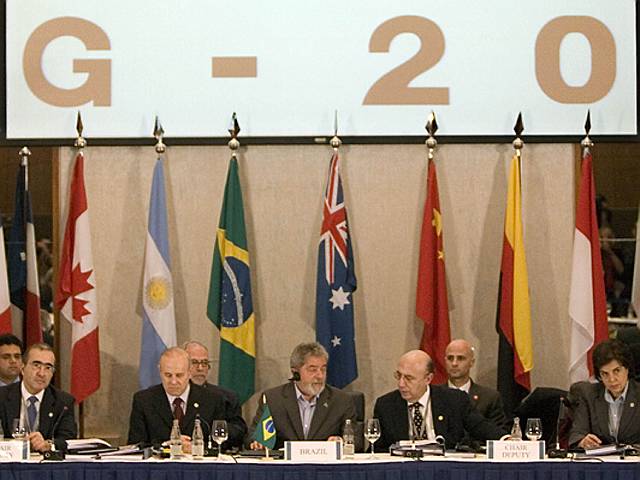
Gordon Brown delivered his leader's speech to the faithful today.
Despite some of the media saying it would be a make or break speech it clearly was never going to be. Knowing that it is far too late to change leaders, Gordon was only really planning to do his usual thing. A plodding speech with tractor stats galore, promises without details, claims which are unsubstantiated, chorus of achievement, talk about what the opposition would do and a few jack-in-the-box policies to try and trip up the Tories. Plus a few sly 'Mandies' aimed at winning back the core and pulling back voters lost to the Lib Dems.
However, technically, as a speech, despite some lukewarm reception from the conference I thought it was his best. We know that Obama could read a tax return and engage more people than Brown will ever manage but compared to Nick Clegg's speech last week it was sparkling . The whips had learnt the lessons of the half empty hall from Monday and ensured that it was packed for the leaders speech.
Sarah Brown went down very well. I don't know why. I think it makes him look like a little boy being taken to primary school for the first time, who won't let go of mummy's hand. As a PR device its obvious why she is used.
'Gordon is messy, Gordon is a good husband. Gordon is kind to children and furry animals'Or - 'Gordon is normal. No really , he is.' I can't imagine Samantha Cameron even having to say
"Dave gets a few beers in at the weekend. Dave likes watching DIY SOS ."To me it just reinforces Gordon's strangeness and its so obvious I can't believe it works, but it seemed to work in Brighton.
After the tearful intro it was a workmanlike start - a bit clunky, but he managed the right pitch and delivery of the tractor stats of Labour achievement. Its his strong point, and his speechwriters were wise to use this device. Basically its just reading out a selection of phrases and soundbites, but Gordon has always managed that well. He got the pacing, and the volume right, so that once the crowd were applauding, he managed to make them cheer and clap louder, as he lengthened the list. Good TV that. I thought better than Mandleson who went a bit squeaky with his crescendos.
Then came the detail.
Or lack of detail, a normal Gordon device.
Here the speech fell back into one of his old budget statements. A litany of vague achievements, aspirations, fantasy promises and traps. Plenty for the comrades to agree with but shockingly short of detail.
More bank regulation - end to bonus culture - more free childcare - the ability to recall bad MPs -Improved health care for the elderly -
Schools, hospitals,kidney machines as Jim Hacker used to say. And, just as in his chancellor days, a lot of it doesn't add up.
The health care at home for the elderly seemed to have unraveled by the 6pm news with a price tag of 1.5 billion more pounds needed or only half as many people as claimed being eligible.
No discussion of cuts of any sort except I.D. cards and that it is such a white elephant its a miracle he didn't dump it at last years speech.
The speech felt like an opposition speech. It would not have been out of place in 1997.
Tough on crime - anti social behaviour,- educasion/ejudkain/ edukasion- more money for schools, - save the NHS- more spending on health care, a people's Postbank at the post offices, reform of the Lords, minimum wage.. What has he been doing for the last 12 years? Has all the parliamentary time been spent on hunting with dogs, stopping smoking in pubs and fighting foreign wars? All these things were promised long ago. Now , that he is about to lose power, its all promised again.
Three things did stand out. The PR kite flyer, dormitories for teenage mothers and the law about debt.
The Proportional Representation 'lite' is a tempter for Nick Clegg. I doubt it will work. Paddy Ashdown fell for it and was then shown the door when the power sharing was no longer needed. Now Gordon tries to tempt Lib Dem voters back to Labour with the promise they desire. Thinking about a hung parliament is a good, if unlikely to succeed, tactic. But you play the hand you have and at least its going to spark some debate, especially on the yellow blogs.
The teenage mother thing is just so odd. Its a right wing Tory favourite and gives Dave the opportunity to embrace something that he would have been as likely to go near as a strange device by the roadside in Afghanistan. He can now say , we'll look at it and claim some needed tough on benefits brownie points from the blue rinse.
The trap though, was the piece barely even being reported. Legislation to enshrine in law that the
budget defecit must be halved within 4 years. The Tories might not like being committed to paying down debt at a rate that means huge, huge tax rises and Cleggian 'savage' cuts to public services. Anymore poison for this chalice?
Overall I think those that wanted to believe will be able to believe and those that didn't believe won't be swayed. A good effort from the PM even though it wasn't outstanding.
But then the aim was only ever to put some fight back into the troops and wrong foot the Tories. Only Cameron/Osborne have a good record in wrong footing Team Brown at conference time. Maybe he has only succeeded in giving George a few extra targets to shoot at next week.
 There's something about bonus that becomes a fetish, frequently invested with more significance than its actual financial value - more, say, than a pay-rise of equivalent value.
There's something about bonus that becomes a fetish, frequently invested with more significance than its actual financial value - more, say, than a pay-rise of equivalent value. 


































